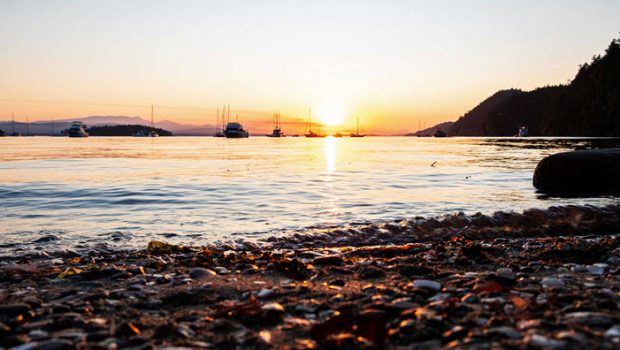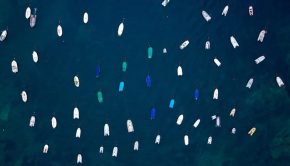Look to the Water
Published on June 16th, 2020
Joe Cline is Managing Editor of 48° North publication which is based in Seattle, WA. His corner of the country has lately been in the news, and Joe has found inspiration in how maritime right-of-way rules determine privilege:
I have been reflecting on the notion of privilege recently, and the ways I may have been a recipient or beneficiary of privilege without recognizing it. It’s leading to ruminations and realizations, both uncomfortable and worthwhile. One thing I’ve found helpful is thinking about how that word—privilege—is used in a maritime context.
In right-of-way rules, “privileged” and “stand-on” are sometimes used interchangeably. Such as: a vessel being overtaken is the most privileged vessel. In this context, privilege is the allowance to continue on your course unaffected, while others must make way for your passage.
Pretty standard stuff for boaters. It’s also sensible and in-line with some societal definitions of privilege—the ability to live your life generally as you wish, unaffected, with some others altering course to give you an easier pathway forward.
Here’s where it gets interesting: to which boat is privilege given in the right-of-way scenario? Sometimes it’s just the rules (starboard rights over port, for example). Yet, in most cases, it is the less advantaged vessel.
The vessel constrained by its draft in a narrow channel is less able to move without running aground than smaller boats nearby. The overtaken boat may have fewer options for speed and maneuverability. Power-driven vessels give privilege to sailboats, whose mobility is limited by conditions and the nature of their propulsion. And, when two sailboats are on the same tack, it is the leeward boat—the one with less access to the wind, and thus less speed and maneuverability—that receives privilege.
It is, of course, more complicated than that, but you get the point. There is inherent fairness and virtue in the principle that boats with more options and ability can, and therefore should, make accommodations for those with less.
Conventional definitions of privilege on land look a lot more like the windward boat or the overtaking boat. The maritime definition has been helping me process my own sense of privilege, and has given me a template with which to think about how I might reframe certain definitions and priorities in pursuit of a more just and equal world.
It is important to say this out loud. As a white man, I have been the recipient of incalculable structural privilege. I am the figurative stand-on vessel far more often than not, and I have enjoyed these advantages without asking for or earning them. This moment hurts, as I feel shamefully exposed for mistakes I’ve made in taking this reality for granted.
Conversely, there are a host of disadvantages and an infinitely deeper hurt that my neighbors and friends of color have endured, and continue to endure. And this is far more important to say aloud.
Boating and sailing are often broadly associated with societal privilege. Optimistically, water-borne enthusiasts hope to increase diversity on the water, and lots of us talk about that. Realistically, too little has been done to take steps toward this attainable goal; and boating and sailing are presently activities with disappointingly homogenous audiences.
I believe the vast majority of boaters and landlubbers alike aspire to be instruments of peace, equality, and justice. Yet in spite (and because!) of those good intentions, we have a lot of work to do.
Like so many others, I’m taking time to listen, to read, to donate, and to resolve to be better. I encourage everyone to join me in these commitments, and challenge us all to work toward tangible good and actionable change. What form this change can take isn’t clear to me today, but this is the overdue beginning of a long conversation in which I welcome help to learn and discern what we can do to help foster more inclusiveness in boating.
As a starting point—like sailors always do for inspiration—we can look to the water. Whatever your experience of life and these difficult last few weeks, the maritime right-of-way rules remind us that privilege can and should be given to the disadvantaged, not the other way around. Be more like boats.
In humility and solidarity,
Joe









 We’ll keep your information safe.
We’ll keep your information safe.